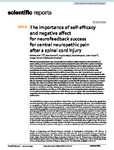The importance of self‑efficacy and negative affect for neurofeedback success for central neuropathic pain after a spinal cord injury
| dc.contributor.author | Anil, Krithika | |
| dc.date.accessioned | 2022-06-29T09:26:57Z | |
| dc.date.issued | 2022-06-29 | |
| dc.identifier.issn | 2045-2322 | |
| dc.identifier.issn | 2045-2322 | |
| dc.identifier.other | 10949 | |
| dc.identifier.uri | http://hdl.handle.net/10026.1/19355 | |
| dc.description.abstract |
EEG‑based neurofeedback uses mental behaviours (MB) to enable voluntary self‑modulation of brain activity, and has potential to relieve central neuropathic pain (CNP) after a spinal cord injury (SCI). This study aimed to understand neurofeedback learning and the relationship between MB and neurofeedback success. Twenty‑five non‑CNP participants and ten CNP participants received neurofeedback training (reinforcing 9–12 Hz; suppressing 4–8 Hz and 20–30 Hz) on four visits. Participants were interviewed about the MB they used after each visit. Questionnaires examined the following factors: self‑efficacy, locus of control, motivation, and workload of neurofeedback. MB were grouped into mental strategies (a goal‑directed mental action) and affect (emotional experience during neurofeedback). Successful non‑CNP participants significantly used more imagination‑related MS and reported more negative affect compared to successful CNP participants. However, no mental strategy was clearly associated with neurofeedback success. There was some association between the lack of success and negative affect. Self‑efficacy was moderately correlated with neurofeedback success (r = < 0.587, p = < 0.020), whereas locus of control, motivation, and workload had low, non‑ significant correlations (r < 0.300, p > 0.05). Affect may be more important than mental strategies for a successful neurofeedback performance. Self‑efficacy was associated with neurofeedback success, suggesting that increasing confidence in one’s neurofeedback abilities may improve neurofeedback performance. | |
| dc.format.extent | 10949- | |
| dc.format.medium | Electronic | |
| dc.language | en | |
| dc.language.iso | en | |
| dc.publisher | Nature Research | |
| dc.subject | Electroencephalography | |
| dc.subject | Humans | |
| dc.subject | Neuralgia | |
| dc.subject | Neurofeedback | |
| dc.subject | Self Efficacy | |
| dc.subject | Spinal Cord Injuries | |
| dc.title | The importance of self‑efficacy and negative affect for neurofeedback success for central neuropathic pain after a spinal cord injury | |
| dc.type | journal-article | |
| dc.type | Journal Article | |
| dc.type | Research Support, Non-U.S. Gov't | |
| plymouth.author-url | https://www.webofscience.com/api/gateway?GWVersion=2&SrcApp=PARTNER_APP&SrcAuth=LinksAMR&KeyUT=WOS:000818983300017&DestLinkType=FullRecord&DestApp=ALL_WOS&UsrCustomerID=11bb513d99f797142bcfeffcc58ea008 | |
| plymouth.issue | 1 | |
| plymouth.volume | 12 | |
| plymouth.publication-status | Published online | |
| plymouth.journal | Scientific Reports | |
| dc.identifier.doi | 10.1038/s41598-022-15213-7 | |
| plymouth.organisational-group | /Plymouth | |
| plymouth.organisational-group | /Plymouth/Faculty of Health | |
| plymouth.organisational-group | /Plymouth/Faculty of Health/School of Health Professions | |
| plymouth.organisational-group | /Plymouth/REF 2021 Researchers by UoA | |
| plymouth.organisational-group | /Plymouth/REF 2021 Researchers by UoA/UoA03 Allied Health Professions, Dentistry, Nursing and Pharmacy | |
| plymouth.organisational-group | /Plymouth/Users by role | |
| plymouth.organisational-group | /Plymouth/Users by role/Academics | |
| dc.publisher.place | England | |
| dcterms.dateAccepted | 2022-04-19 | |
| dc.rights.embargodate | 2022-6-30 | |
| dc.identifier.eissn | 2045-2322 | |
| dc.rights.embargoperiod | Not known | |
| rioxxterms.versionofrecord | 10.1038/s41598-022-15213-7 | |
| rioxxterms.licenseref.uri | http://www.rioxx.net/licenses/all-rights-reserved | |
| rioxxterms.licenseref.startdate | 2022-06-29 | |
| rioxxterms.type | Journal Article/Review |


